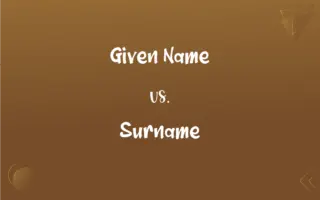Indicative vs. Subjunctive: What's the Difference?
Edited by Janet White || By Harlon Moss || Published on November 28, 2023
The indicative mood states facts or asks questions, while the subjunctive mood expresses wishes, doubts, or hypothetical situations.

Key Differences
The indicative mood is used for stating facts, asking questions, or declaring certainty. The subjunctive mood, in contrast, is used to express wishes, doubts, recommendations, or hypothetical situations.
Indicative verbs describe reality and concrete situations. Subjunctive verbs often follow words like 'wish', 'if', or 'though', indicating uncertainty or speculation.
In English grammar, the indicative is the most commonly used mood for conveying information. The subjunctive is less common and is used to convey a tone of non-reality.
Indicative forms are straightforward and align with the tense of the sentence. The subjunctive can sometimes use different verb forms, like 'were' instead of 'was' in hypotheticals.
The indicative is used in everyday speech and writing for factual statements. The subjunctive appears in more formal or literary contexts, expressing desires or conditional states.
ADVERTISEMENT
Comparison Chart
Purpose
States facts or asks questions
Expresses wishes, doubts, or hypotheticals
Usage
Describes reality and concrete situations
Indicates uncertainty, speculation, or non-reality
Commonality
Most common in everyday language
Less common, often formal or literary
Verb Forms
Uses standard verb forms matching tense
May use different forms, like 'were' for hypotheticals
Context of Appearance
Everyday speech and factual writing
Formal, literary, or wishful contexts
ADVERTISEMENT
Indicative and Subjunctive Definitions
Indicative
Used for asking questions.
Do you know the time?
Subjunctive
Expresses wishes, hypotheticals, or possibilities.
I wish I were taller.
Indicative
Presents information as it is.
The book is on the table.
Subjunctive
Often follows certain expressions like 'as if' or 'though'.
He talks as if he were an expert.
Indicative
Expresses statements of fact or reality.
The sun rises in the east.
Subjunctive
Used for giving advice or recommendations.
I suggest that he study harder.
Indicative
Conveys actual situations or known data.
She drives to work every day.
Subjunctive
Indicates uncertainty or contrary-to-fact scenarios.
If I were you, I would apologize.
Indicative
Indicates certainty or likelihood.
It looks like it will rain.
Subjunctive
Shows desires or imaginary situations.
It’s essential that she be present at the meeting.
Indicative
Serving to indicate
Symptoms indicative of anemia.
An insignia indicative of high rank.
Subjunctive
Of, relating to, or being a mood of a verb used in some languages for contingent or hypothetical action, action viewed subjectively, or grammatically subordinate statements.
Indicative
(Grammar) Of, relating to, or being the mood of the verb used in ordinary objective statements.
FAQs
What is the indicative mood?
It expresses factual statements or asks questions.
Do all verbs have a subjunctive form?
Most do, though it's often similar to indicative forms.
What does the subjunctive mood express?
Wishes, doubts, hypotheticals, or possibilities.
Is the indicative used in everyday speech?
Yes, it's the most common mood in daily use.
How does the subjunctive affect verb tense?
It sometimes uses different forms, like 'were' for 'was'.
Can the indicative be used for opinions?
Yes, if they are stated as facts.
Is the subjunctive common in English?
Less common than indicative, often in formal settings.
Can the subjunctive mood be used for orders?
Yes, particularly in formal requests or commands.
Do questions always use the indicative mood?
Generally, yes, as they inquire about facts or information.
Are indicative verbs easy to identify?
Yes, as they align with standard verb forms and tenses.
Is the subjunctive important in English?
Yes, for expressing non-real situations, wishes, or formal requests.
How is the subjunctive used in wishes?
It expresses a desire for something not currently true.
Are conditional sentences always subjunctive?
Often, especially in contrary-to-fact conditions.
Does the subjunctive imply doubt?
Often, especially in contexts of uncertainty or speculation.
Is the subjunctive used for unreal situations?
Yes, especially in hypothetical or imagined scenarios.
Can the indicative express future events?
Yes, if they are presented as factual or certain.
Can the indicative mood be negative?
Yes, it can express negative facts or information.
Are all factual statements in the indicative mood?
Generally, yes, as they convey actual situations or data.
Can the subjunctive mood express commands?
Yes, especially in formal or polite requests.
Is the indicative used in storytelling?
Yes, for narrating events or describing situations.
About Author
Written by
Harlon MossHarlon is a seasoned quality moderator and accomplished content writer for Difference Wiki. An alumnus of the prestigious University of California, he earned his degree in Computer Science. Leveraging his academic background, Harlon brings a meticulous and informed perspective to his work, ensuring content accuracy and excellence.
Edited by
Janet WhiteJanet White has been an esteemed writer and blogger for Difference Wiki. Holding a Master's degree in Science and Medical Journalism from the prestigious Boston University, she has consistently demonstrated her expertise and passion for her field. When she's not immersed in her work, Janet relishes her time exercising, delving into a good book, and cherishing moments with friends and family.































































